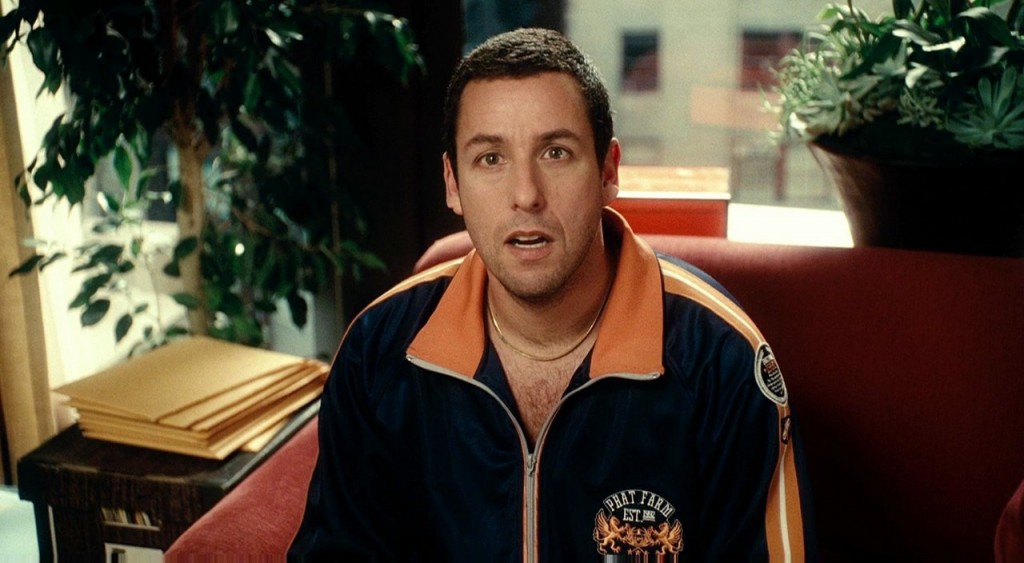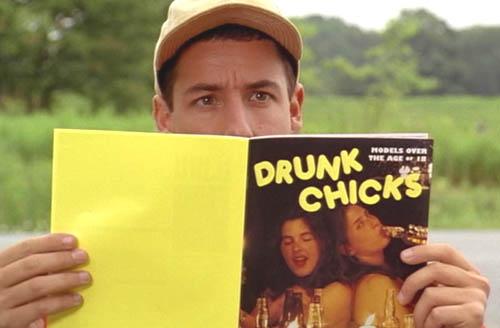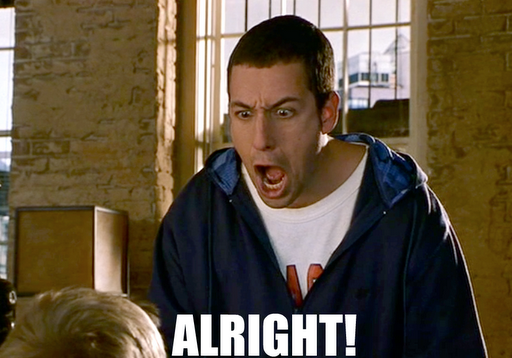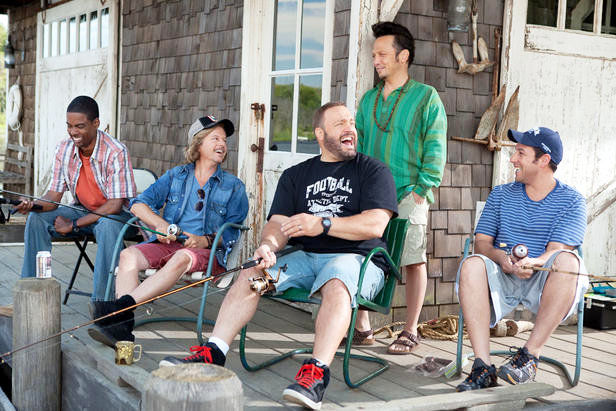James does the previously unthinkable, as he defends the career of Adam Sandler with intelligent thought. Originally posted on June 12, 2012.
A little while ago, Alex and I were writing some hilaaaaaarious jokes for the intro to our Judd Apatow-approved video podcast. As Alex (and large sections of the moviegoing public) is wont to do, he suggested one along the lines of “This episode is brought to you by Adam Sandler jokes. Remember? Those movies you liked when you were 7?” This seems to be the general consensus on Adam Sandler, that he makes immature movies for either kids or immature adults. Actually, the more recent general consensus is that Sandler makes bad immature movies for either kids or immature adults, but also made some at least decent movies many years ago. Film fans have a special attachment to the movies they watch a number of times when they’re young, and will continue to like them more than their current tastes would normally dictate as a result. At a point, nostalgia, memories and familiarity bleed through our judgment and become more important than our current tastes when judging a movie. As much as I want to say that Happy Gilmore is a ‘good’ movie, all I can say with confidence is that I’ve always enjoyed it, which sounds like the same thing, but is entirely different. I think a lot of people my age feel that way about that movie, that its quality does not come from its merits but from its place in their personal and emotional memories. For a number of reasons, this is the way I feel about Adam Sandler as a whole.
Now, I understand what I’m getting into here; defending Adam Sandler is an uphill battle. I get this. I saw Jack and Jill. (Okay, no I didn’t. That movie looked like total shit.) And to be accurate, I’m not really defending him in the sense that I’m going to try explain to you that you’re wrong if you think Jack & Jill is a bad movie. It probably is. That’s not my point, however. I’m not really defending him as a good actor, or an actor that makes good choices, or somebody who consistently writes funny movies. I’m also not just going to say that we should forgive his poor films because he seems to be a pretty decent human being in real life. But there has to be something more to Sandler’s films, something we simply haven’t been looking at closely enough to see.
I can’t recall the first time I saw Billy Madison, but I know I was pretty young; definitely well below whatever the ratings guide thought was appropriate. It was a movie I found very funny then, even though I knew I didn’t understand all of the jokes. I wasn’t sure why Billy thought it was so funny when the teacher asked the class to go to page 69, but I knew a lot of the other jokes made me laugh. Happy Gilmore followed, occupied a similar role in both film comedy and my heart. Those were probably two of the first movies that I quoted the way that I continue to quote movies that make me laugh. Sure, all genres have famous quotes, but it’s the comedies that give us the lines that are most fun to say over and over to our friends. It’s a shorthand that conveys a whole situation in just a few words, and is almost guaranteed to make your friend laugh. “Mrs Lippy’s car… is green,” is certainly not funny on its own, but to those who have seen Billy Madison, you’ll probably get a laugh. It was a way to tell your friends that outside of this immediate situation, there is something we both find funny. Comedy is one of the most subjective things in the world, and to find someone with the same sense of humour is a powerful thing, particularly at a young age.
Another piece of media that tended to turn me into a walking Sandler quote machine was not a movie, but his 1993 comedy album They’re All Going to Laugh at You. And considering that it went double platinum and was nominated for a Grammy, I guess I wasn’t the only one. There was something even more free and whimsical about a comedy CD than there was in a ninety-minute movie. Things changed quickly. No characters were around for more than 5 minutes. Children have particularly wild imaginations, and this constant change of scenery, story and people throughout Sandler’s comedy album continued to allow me to use mine to further enjoy the jokes about Fatty McGee.
I’m certain I couldn’t appreciate it at the time, but themes of youth and growing up were major parts of both Billy Madison and Happy Gilmore, as well as the lesser-known Airheads, a movie that came out earlier but I didn’t see until later. As the third lead in Airheads, Sandler is part of a band that takes a radio station hostage until the station agrees to play the band/domestic terrorist faction’s music. The band may be young and misunderstood by older men wearing suits, but they know their way of doing things is how they want to live forever, which is not an unfamiliar sentiment for young people. In Billy Madison, Sandler’s titular character is a partyer without ambition who must go through school again to prove to his father that he can run the family business when his father dies, an oedipal exercise with comedic results. Happy Gilmore continues this trend to an extent, as it is about (a notably fatherless) Sandler as an aspiring hockey player who proves to be an incredible, slapshot-wielding professional golfer. As golf is traditionally a middle-aged or older man’s sports, Gilmore must quell his youthful energy and temper to fit in and conquer the most conservative old man sport ever invented. It’s easy to see how all these movies make nice little metaphors for the changes we’re expected to make when growing up which are pretty universal, but the situation in Happy Gilmore may have some broad connections to Sandler’s life personally.
Sandler has discussed in interviews that his father had a pretty serious temper. If the amount of yelling we see his characters do is any indication, the younger Sandler may have had some of this passed down to him as well. Besides an explosive temper being central to Happy Gilmore, I don’t think I need to explain the plot of his later movie Anger Management to show how it applies in that case. The Waterboy is a movie about channeling excessive amounts of anger (curiously fuelled by an overbearing parent) into something positive. Little Nicky, in a broad way, is similar to Billy Madison in that it’s about taking over his father’s business, but instead of running hotels, Sandler is about to run Hell because his father is Satan. Mr. Deeds is similarly about taking Sandler’s character taking over a family company, this time from a deceased male relative. Most of his movies up until this point are about taking over for/becoming your father in a general way, and sprinkled in are some more Sandler-specific issues of anger and temper control.
The later part of Sandler’s career, however, has a decidedly different set of struggles. Even if you think that the jokes in his films are not maturing, it must be noted that the subject matter that he’s dealing with certainly is. He may continue to approach the themes in a juvenile way, and there are still too many dick, fart and poo jokes for you, but there has at least been a transition as Sandler has aged. His soon-to-be-released That’s My Boy features Sandler what appears to basically be his character from Billy Madison, if Madison hadn’t turned things around at the end of the movie (and didn’t come from a rich family). Sandler’s character still loves to party, but is now middle-aged and broke, and tracks down his son in order to borrow money to pay back the IRS. I haven’t seen this movie yet, but I’m going to guess that it’s a father-son version of She’s All That: at first Sandler fakes the relationship and growth for selfish reasons, but ends up feeling the way he sets out to pretend he’s feeling leaving everybody better off in the end. The final message will be positive, but the source is likely a little darker: Sandler’s fear of being a bad father. Of course this is exaggerated and no way a reflection of who he is, but functions of a fear of who he could be. Sandler’s character will likely work towards a redemption the real Sandler hopes he never needs for his daughters.
We see something similar in Grown Ups, Sandler’s most financially successful movie to date and the only one of his films to spawn a sequel. The movie is about a middle-aged group of men whose high school basketball coach dies, leading them all to reunite in order to attend the funeral. But deeper down, the movie actually seems to be about Sandler’s apprehensions about the job he’s doing as a father. In the film, Sandler plays a successful Hollywood agent who has spoiled his kids, kids whose brattiness is painfully apparent when they deal with Sandler, his friends, and hometown citizens. This is something that is the other side of the parental fears of That’s My Boy. Instead of doing nothing and providing nothing in that film, in Grown Ups, Sandler’s character has given his kids everything and made them appreciate nothing, a fear I imagine to be potent among nice rich people with kids. Similarly, the entire plot of Click is set off by Sandler’s role as an overworked parent who has no time to see his family, a blanket concern that is perhaps closest to Sandler’s real life.
There is one theme that is present throughout much of Sandler’s career, both within the narrative of his films and how they are made and marketed: playing the role of an outcast of sorts. I have already discussed how Airheads, Billy Madison and Happy Gilmore show Sandler’s respective characters struggling to gain acceptance into a certain world, often being pressured to change something about himself to do so. Happy Gilmore and The Waterboy both depict him as a constantly picked-on and desperately lonely person, with the exception of an elderly person and, eventually, the romantic attention of a female. Little Nicky, Punch Drunk Love, Eight Crazy Nights, Reign Over Me and Funny People all show his characters as entirely or almost entirely friendless, at least at the start of the film. Outside the narrative of his films, we can find a few possible causes for these feelings if they are rooted in reality. First is his Jewishness he clearly has no problem reminding us with, with hits like The Hanukah Song and frequent references to his heritage in interviews. Jewishness has been a particularly powerful source of isolation in American comedy for a long time. It has also been pointed out by many that contrary (for some reason) to most people’s assumptions, Sandler appears to be politically conservative, having donated funds to Republican candidates which in Boston (where he grew up), New York or Los Angeles (where we’ve known him to work) again puts you in the minority.
Sandler has found a great and frequently used solution to this problem of being on the outside: use your pull to surround yourself with friends. We constantly see Sandler on-screen with the same people. David Spade, Kevin Nealon, Rob Schneider, Kevin James, Steve Buscemi, Chris Rock, John Turturro, Jon Lovitz, Clint Howard, Norm Macdonald, Nick Swardson can all be seen in multiple Adam Sandler movies. It is not rare to see people who have achieved a certain level of status in Hollywood use this to work with actors they like to work with with but what is a bit exceptional is his working relationship with Allen Covert, Peter Dante, and Jonathan Loughran. These three were college friends of Sandler whose combined filmographies contain almost no credits in movies that Adam Sandler neither acts in or produces. These are just his group of friends that he gets work for. I’m not saying Adam Sandler is some kind of loser who needs to hire his friends to work with him because no one else likes him, but everything I’ve read or heard makes it seem like he is a well-liked man who is easy to get along with. He appears to be genuine, grounded, sweet and funny. What’s interesting to me is the lengths he goes to not to be left out, while making movies that explore just that.
Vulnerability is the root of all comedy and when we feel vulnerable, we feel like kids again. Sandler is someone I remember when I was a kid and I see his career as a showcase of how I felt when I was that age. And now I can see him dealing with problems of different ages but it all shows up to me through that lens, just as I said about movies you watch when you’re young. He could make bad movies for the rest of his life, or great ones, but my sense of him will be the same. It’s not about him or his work being good or bad. Too many things are wrapped up in it for those words to really apply.







